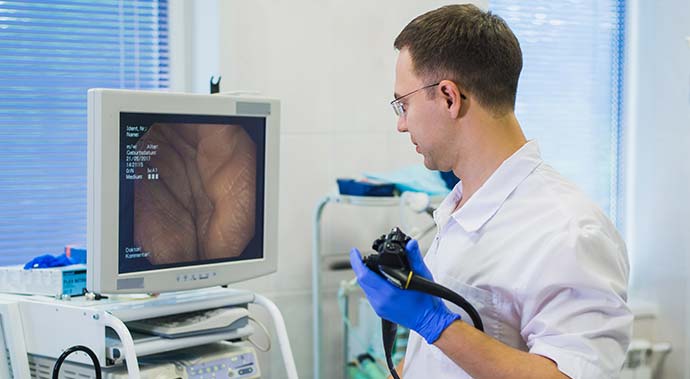
From screenings to preventative strategies, Marshall Medical combines experience and the latest technology for excellent gastrointestinal care.
Gastroenterology is the study of the normal function and diseases of the esophagus, stomach, small intestine, colon and rectum, pancreas, gallbladder, bile ducts and liver. At Marshall Medical we offer comprehensive GI care with convenient local access, enhanced by the latest technology for both diagnostic and treatment services. Gastrointestinal services usually require a physician referral, so please ask your regular doctor to help with that first step.
Conditions treated by a Gastroenterologist:
- Colon polyps and cancer
- Hepatitis
- Gastroesophageal reflux (heartburn)
- Peptic ulcer disease
- Colitis
- Gallbladder and biliary tract disease
- Irritable Bowel Syndrome (IBS)
- Pancreatitis
- Inflammatory bowel disease (IBD)
- Celiac disease
- Small intestinal bacterial overgrowth (SIBO)
- Food allergies and intolerances
- Stomach ulcers
- Diverticulitis
- Appendicitis
- Colorectal polyps
- Hemorrhoids
- Esophageal disorders
- Swallowing difficulties
- Gastroesophageal reflux disease (GERD)
- Hiatal hernias
- Liver diseases, such as hepatitis and fatty liver disease
- Cirrhosis
- Pancreatic, biliary and gallbladder diseases
- Gallstones
Based on a doctor’s referral, you might come to a gastroenterologist with common symptoms, such as:
- Abdominal pain
- Bloated stomach
- Indigestion
- Gas and gas pain
- Nausea and vomiting
- Rectal bleeding
- Diarrhea
- Constipation or difficulty pooping
- Unexplained weight loss or weight gain
- Heartburn
- Liver Disease or Jaundice
Gastrointestinal FAQs
What tests do gastroenterologists perform?
A gastroenterologist may begin by physically examining you. They may feel and listen to your abdominal organs from the outside, or insert a finger into your rectum. They may order follow-up tests, such as blood tests, poop tests or imaging tests like GI X-ray exams that take pictures of your organs from the outside.
Based on a referral by your doctor, your Gastroenterologist may recommend a Colonoscopy and Colon Cancer Screening.
Colonoscopy is an exam using a tube-like instrument to look inside the rectum and colon for polyps, abnormal areas or cancer. Tissue samples can be collected (biopsy) and abnormal growths can be removed.
How it works:
- The procedure is typically performed under sedation.
- The colonoscope is inserted through the anus and advanced into the colon.
- The doctor can visually inspect the lining of the colon for any abnormalities, such as polyps or cancer.
- If polyps are found, they can be removed during the colonoscopy to prevent them from potentially becoming cancerous.
Benefits:
- Early detection: Colonoscopies allow for early detection of colorectal cancer, which significantly improves the chances of successful treatment.
- Prevention: Removing polyps during a colonoscopy can prevent them from developing into cancer.
What is the most common gastrointestinal condition?
In the United States, it is estimated that 10-15% of the adult population suffers from Irritable Bowel Syndrome (IBS) symptoms, yet only 5-7% of adults have been diagnosed with the disease. IBS is the most common disease diagnosed by gastroenterologists and one of the most common disorders seen by primary care physicians.
Which is the most common upper gastrointestinal condition?
The most common esophageal disorder is gastrointestinal reflux disease (GERD). GERD is the condition in which excessive stomach acid moves back into the esophagus (acid reflux), causing inflammation.
What does a UGI series/Barium study consist of?
An upper gastrointestinal series or Barium study uses X-rays and a barium-based contrast material to visualize the esophagus, stomach and duodenum, allowing doctors to assess their function and identify any abnormalities.
What is the most common procedure done in the upper digestive system?
The most common procedures in the upper digestive system include upper endoscopy (EGD) (also known as esophagogastroduodenoscopy) and upper GI series (barium swallow), used for diagnosing and treating conditions of the esophagus, stomach, and upper small intestine.
This procedure involves inserting a thin, flexible tube with a camera (endoscope) down the esophagus, into the stomach, and into the duodenum (first part of the small intestine). It's used to visualize the lining of these organs, allowing doctors to identify abnormalities like ulcers, inflammation, polyps, or tumors. During an upper endoscopy, biopsies can be taken, and treatments like removing polyps or dilating strictures can be performed.


